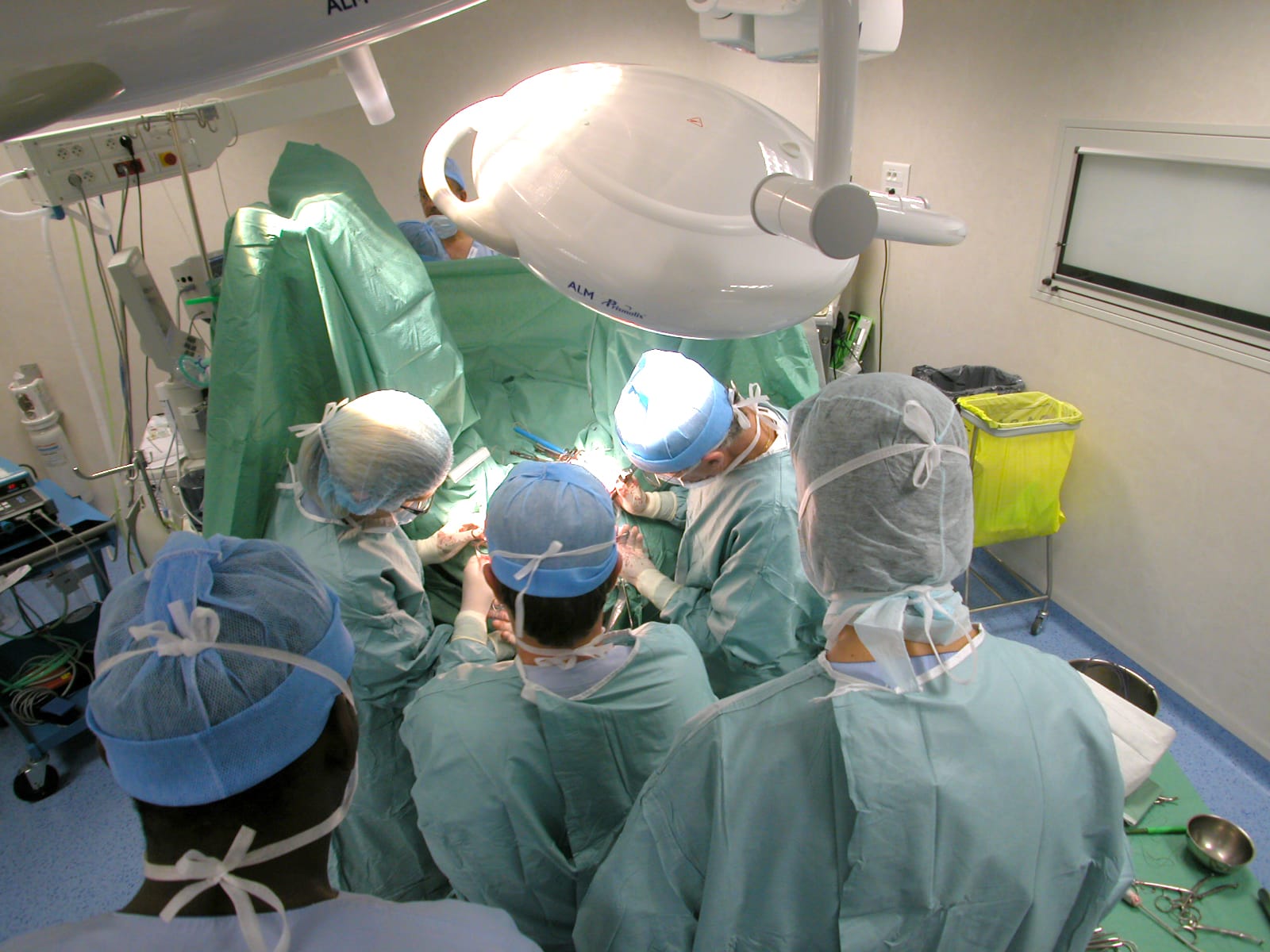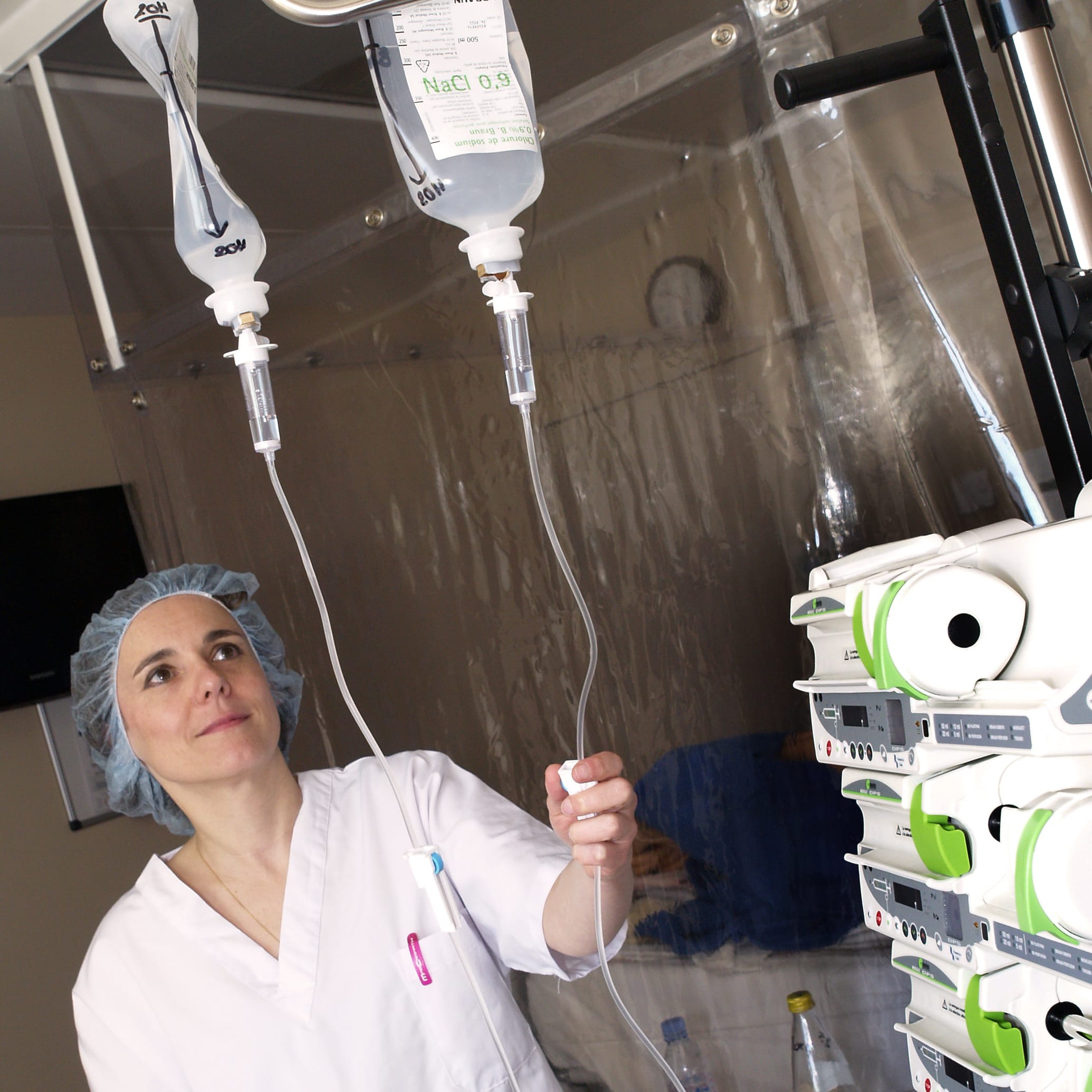MEDICAL ONCOLOGY

Oncology/Cancerology is the medical specialty consisting in study, diagnosis and treatment of cancer diseases.
Medical oncologists are thoroughly versed in the mechanisms of cancer, the modes of action of the drugs used to treat them, and the possible complications associated with the treatments. They coordinate treatment of cancer patients.
The different treatments for cancer are:
- surgery
- chemotherapy
- radiotherapy
- immunotherapy
- hormone therapy
- biotherapies or targeted therapeutic strategies
- oral therapies
- thérapies orales
CANCER TREATMENTS
Surgery
Definition
Surgery is local cancer treatment of which the objective is to remove the tumor, corresponding lymph nodes and possible metastases. Other terms include ablation or exeresis of the tumor or cancerous lesions.
Treatment

Surgery can be carried out alone or combined with other treatments.
As a “stand-alone” treatment, surgery is addressed to localized forms of cancer discovered at an early stage. The objective is to cure the cancer through this single surgical gesture, when total ablation of the tumor is possible and when its characteristics (size, stage, grade) established during diagnostic work-up clearly show that it has not been propagated either locally or elsewhere in the body.
Surgery is often associated with other treatment modalities, including:
- radiotherapy,
- medical treatments.
When they are carried out prior to surgery, medical treatments and radiotherapy are termed neo-adjuvants (or preoperative). Their goal is to decrease the size of the tumor so as to facilitate its ablation.
When medical treatments or radiotherapy are prescribed subsequent to surgery, they are termed adjuvant (or postoperative) treatment.
Their goal is particularly to eliminate cancerous cells: (a) still present in the organism but not visible (medical treatments) or (b) at the area having been operated on (radiotherapy) in view of limiting the risk of recurrence or the occurrence of metastases.
Chemotherapy
Definition
 Chemotherapy is treatment involving the administration of drugs acting on cancer cells in such a way as to destroy them or to prevent them from multiplying.
Chemotherapy is treatment involving the administration of drugs acting on cancer cells in such a way as to destroy them or to prevent them from multiplying.
Treatment
There exist numerous chemotherapy drugs, and they are often associated with one another so as to enhance treatment effectiveness. They can be administered by infusion, by injection or in tablets.
While chemotherapy drugs affect cancer, they also affect healthy cells that divide rapidly, thereby provoking adverse effects: nausea, vomiting, loss of hair, fatigue. Variable according to the drugs and to a given person’s reaction, their effects are temporary but at times difficult to endure.
Radiotherapy
Definition
Radiotherapy is loco-regional cancer treatment. It consists in employing rays (also known as radiation or irradiation) to destroy cancer cells by blocking their capacity to multiply.
Treatment
The goal of irradiation is to destroy cancer cells while conserving healthy tissues and neighboring organs to the greatest possible extent.
More than half of cancer patients are treated by radiotherapy at one phase or another of their care pathways.
External radiotherapy is to be distinguished from brachytherapy:
- In external radiotherapy, the rays are beamed by a machine located close to the patient; they penetrate the skin to reach the tumor.
- In brachytherapy, radioactive sources are directly implanted inside the body of the sick person.
There also exists a third mode of radiotherapy, which is termed metabolic. It consists in administering, by oral route (beverage or capsule) or by intravenous injection a radioactive substance that settles on the cancer cells and metastases so as to destroy them.
Metabolic radiotherapy is used to treat certain cancers of the thyroid, Vaquez disease and certain bone metastases.
Immunotherapy
Definition
 Immunotherapy is treatment that consists in administering substances that will stimulate the immune defenses of the organism so as combat certain diseases, particularly some cancers and degenerative diseases.
Immunotherapy is treatment that consists in administering substances that will stimulate the immune defenses of the organism so as combat certain diseases, particularly some cancers and degenerative diseases.
In a broader sense, immunotherapy also denotes any therapy using the proteins produced by the cells of the immune system, particularly immunoglobulins, even though the therapy is not necessarily aimed at stimulating immunity.
Treatment
Two types of immunotherapy are to be distinguished; while the applications of local immunotherapy are infrequent, those of general immunotherapy are common.
In immunotheray, cytokines and/or (at times) antibodies that have been modified to be “humanized” are used, the objective being to avoid immune defense reactions due to the strength of the quantities employed.
Hormone therapy
Definition
Anticancer hormone is aimed at blocking the stimulation of cancer cells by hormones. Blocking is achieved using antagonist hormones (androgens: male hormone) to counter the action of estrogens that stimulate breast cancers; conversely, female hormones (estrogens) counter the androgens that stimulate prostate cancer. It is also possible to block the physiological action of the hormones, or to prevent them from acting at the level of the cancer cells.
Treatment
In the presence of certain cancers (prostate cancer, breast cancer: hormone-dependent cancers), hormone action is suppressed by stimulating the cancer tissues or by bringing hormones to counter their proliferation.
Biotherapy and targeted therapies
Biotherapy
Biotherapy is a therapeutic method based on the use of living organisms (yeast, leaven, some microbes) or of substances removed from living organisms (hormones, organ or tissue extracts).
It differs from chemotherapy, which uses synthetic substances.
Targeted therapies
“Targeted therapies” are therapies directed against molecular targets that are present and considered as having a role in the neoplasic transformation of cancer cells.
They are treatments using drugs that, according to their targets, are aimed at either slowing or blocking the growth of cancer cells by starving them, by commanding their death, by having the immune system fight them, or by impelling them to regain normality.
PRESS REVIEW
Cancers : des prises en charge toujours plus ciblées et personnalisées
CHU magazine n°76 – Juin 2018

